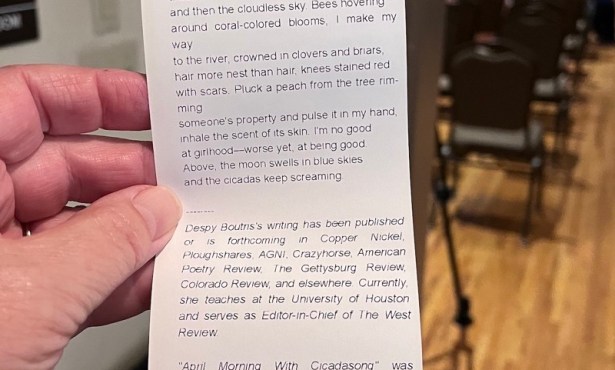Lisa See at the Women’s Literary Festival
One-Day Event Takes Place May 1 at the DoubleTree
Now in its fifth year, Santa Barbara’s Women’s Literary Festival continues its tradition of bringing together female writers of diverse backgrounds. This year’s lineup includes swimmer extraordinaire Lynne Cox, American Indian author LeAnn Howe, and Latina writer and social activist Graciela Limon, as well as bestselling novelist Lisa See. See’s latest book, Shangai Girls, tells the story of sisters Pearl and May Chin, whose privileged lives in “the Paris of Asia” change dramatically in the summer of 1937. In following the sisters across the world to California, See uncovers the kitsch culture of Hollywood’s China City and investigates the Chinese Confession Program of the 1950s.
See spoke to me by phone from Los Angeles last week.

Your last two novels were set in 17th- and 19th-century China. What made you decide to set this novel in the 20th century and to bring your characters to the States? There were certain things I wanted to write about. Shanghai had been considered the Paris of Asia, and all that changed in August 1937. I’ve always been interested in final moments before a huge change. I also wanted to write about the Confession Program of 1957. Scholars have written very little about it, probably in part because the people who participated don’t want to talk about it. There’s a lot of shame, embarrassment, and guilt surrounding it. I actually felt like it was now or never—like if I was going to talk to people who had been involved, I needed to do it now while they were still alive.
Tell me a little bit about China City and what you discovered in your research. China City was one of four Chinatowns in L.A. at that time. It was created by Christine Sterling, who also created Olvera Street … Olvera Street was supposed to be this authentic Mexican marketplace, and China City was the same kind of idea: one square block surrounded by a mini Great Wall and filled with pieces of discarded movie sets. It wasn’t terribly authentic, but it had a certain kind of charm.
Years after it had closed and much of it had been demolished, my family moved our Chinese antique store into the last remaining building of China City. As a girl, I spent a lot of time in what I have come to think of as the skeleton of China City. It meant so much to me as a child just to be in that old building. Today there isn’t a single brick left. China City has been wiped off the map. So I kind of wanted to go out and talk to people who remembered it.
How did you get people to talk? Talking about China City was easy. People had a lot of affection for it. It was a goofy place, but fun. And so those stories really were very easy and light, and the interviews were full of laughter. Finding people who had been affected by the Confession Program was pretty hard. I talked to one man here in Southern California who told me his whole story and then said, “We have never told our children or grandchildren what happened back then because we aren’t dead yet, so we aren’t safe yet.” That sense of fear that you are somehow going to be caught and sent back—that’s something I have run into again and again and again.
Your books tend to focus on women, and the challenges they face. What’s the most important women’s issue in Shanghai Girls? We have all these interesting relationships in our lives: mother/daughter, husband/wife. But the sibling relationship is really unique. It is typically the longest relationship you have in your lifetime. Here is someone who has known you from birth, who loves and supports you for many years. So I was really interested in writing about that relationship. I don’t feel like I have read that many books about sisters that really feel like they take in everything: the good parts, and also the dark shadow side of sisterhood.
4•1•1
Lisa See will speak at the Women’s Literary Festival, which runs from 8:30 a.m. to 3:30 p.m. on Saturday, May 1 at Fess Parker’s DoubleTree Resort (633 E. Cabrillo Blvd.). To learn more or to register, call 688-9717 or visit womensliteraryfestival.com.



